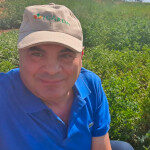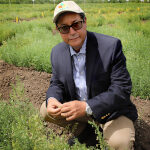

No Posts Found.
Dear esteemed partners, supporters, and colleagues,
In a world reeling from COVID-19, the recent escalation in energy and food prices is a new and significant threat to global food and nutrition security. As ever, this latest crisis will disproportionally affect the communities CGIAR serves – those in low- and middle-income countries already vulnerable to the impact of climate change.
In the region where we work, rising temperatures and growing water scarcity already pose an existential threat to agroecosystems and the livelihoods of farming communities. So although we will factor new and unprecedented shocks into our future work, in 2021, we stayed firmly on track with our demand-driven research obligations. By doing so, our innovations can still offer clear scope to address rapidly changing global food production networks. For example, our improved barley and legume varieties can provide an alternative for grain imports under pressure today.
But if countries are to adopt and scale our new approaches, they need to adopt a systemic approach – more experts, better knowledge-sharing, improved value and supply chains, and more favorable policies – a fully climate-adapted agri-food system is as strong as its weakest link. To this end, ICARDA worked throughout 2021 with partners to firmly integrate capacity building into our work via numerous training workshops, demonstrations, and academic partnerships, reaching thousands of farmers, extension workers, and students – tomorrow’s experts. Further, our groundbreaking evidence-based research on value chains and farmers’ needs will better inform domestic and international policymakers to optimize newly generated, bold agri-food approaches.
In the following pages, you can also read about our 2021 research covering our high-yielding climate-adapted crops, integrated climate-resilient agrosilvopastoral, and livestock farming systems, and improved approaches to managing dwindling water resources. You will also read about how ICARDA is stepping up to raise global awareness of the importance of collecting, conserving, and developing vital genetic resources to protect fragile agrobiodiversity.
More than anything, the pandemic made us determined to help drive CGIAR’s ongoing transition to a streamlined, integrated, and dynamic One CGIAR that delivers a greater impact and more robust food systems efficiently – both across the dry areas where we work and globally.
After officially joining the One CGIAR in late 2020, our restructured science teams were already in place for a much higher degree of integration. Across the CGIAR, and alongside our partners, donors, and other CGIAR Centers, we began developing the multi-stakeholder initiatives that will frame One CGIAR’s future work. We are also reaching out to relative newcomers, non-CGIAR countries, and bilateral donors to ensure that ICARDA continues to serve them either bilaterally or within One CGIAR.
Above all, 2020 highlighted our long-term host country arrangements and the trust we have built with partners and donors over four decades in the CWANA region and beyond. Under a united One CGIAR, we will be uniquely placed to improve food and water security for dryland family farmers and progress towards the Sustainable Development Goals. Regardless of the 2020 challenges, we see a bright and unified future.

